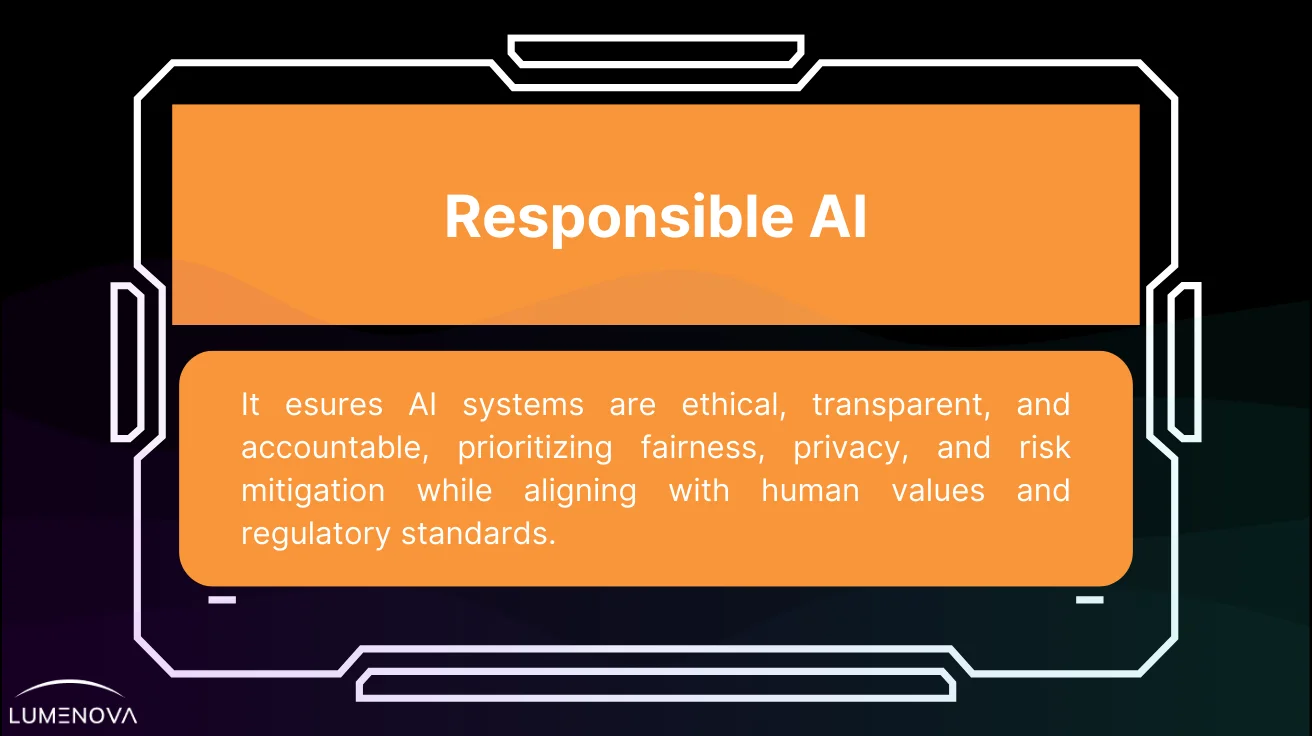Responsible AI (RAI)
Responsible AI is the practice of designing and deploying AI systems that align with ethical standards, prioritize accountability, and ensure fairness and transparency. It involves making deliberate efforts to minimize bias, uphold privacy, and avoid unintended harm caused by AI technologies.

The responsible use of AI ensures that AI systems are developed with a focus on positive societal impacts and compliance with legal, ethical, and organizational standards. Responsible AI governance plays a crucial role in managing AI systems and holding organizations accountable for their outcomes.
Responsible AI Meaning and Core Principles
Understanding the meaning of responsible AI involves focusing on these essential pillars:
Fairness
AI must not perpetuate discriminatory outcomes such that AI-driven or influenced decisions are equitable for all individuals and groups. Socially responsible AI aims to reduce discriminatory outcomes and maintain equal opportunity.
Transparency
Transparency in AI systems involves making the details (e.g., training, testing, and validation procedures, model architectures, data characteristics, cybersecurity measures, intended purpose, etc.) of an AI system understandable and accessible to stakeholders. It requires documenting and disclosing relevant information on how AI models are developed and used, including their training data, algorithms, and operational environments.
Explainability
Explainability requires that AI systems provide comprehensible and meaningful insights into their decision-making and output processes. This helps stakeholders understand how an AI system functions on a granular level, bolstering evaluation ofand trust in AI outcomes, especially in complex or high-stakes application scenarios.
Accountability
Organizations must take responsibility for the impacts of their AI systems, implementing robust oversight and monitoring policies, procedures, and mechanisms throughout relevant stages of the AI lifecycle.
Privacy and Security
Protecting sensitive data and proprietary systems from misuse is central to responsible AI practices.
Sustainability
AI should support long-term societal and environmental goals, promoting the sustainable use of technology.
Why Is Responsible AI Important?
The function of responsible AI is to create trust in AI technologies by ensuring they align with human values, and perform reliably, consistently, and safely while maintaining adversarial robustness . As AI proliferates across industries, implementing responsible AI practices to prevent misuse, reduce risks, and foster confidence is paramount.
- Protects Users: Safeguards against biases and unethical practices.
- Enhances Compliance: Meets legal and regulatory requirements through responsible AI frameworks.
- Builds Trust: Transparent and fair AI systems encourage user and stakeholder confidence.
- Supports Innovation: Enables sustainable growth in AI adoption by mitigating risks.
How to Implement Responsible AI
Adopting responsible AI solutions involves establishing ethical guidelines, deploying governance structures, and leveraging responsible AI tools to evaluate and improve AI systems. Key steps include:
Promote AI Literacy
If people don’t know how to use AI, they may use it poorly, leading to unintended consequences. Regular upskilling and reskilling are crucial to ensure the proper use of AI and adherence to responsible AI practices.
Develop a Responsible AI Framework
A responsible AI framework outlines best practices that drive and support fairness, accountability, transparency, and ethics in AI throughout its lifecycle.
Conduct Bias Audits
Regularly evaluate AI models for discriminatory outcomes. Using responsible AI tools, like bias audits and impact assessments, organizations can identify and mitigate biases and their potential real-world consequences.
Train AI Teams on Ethics
Provide education on AI responsibility and ethical use practices to ensure the responsible use of AI by all stakeholders.
Leverage Explainability Tools
Explainable AI helps users understand how AI systems make decisions, promoting responsible AI development and trust.
Monitor AI Systems Regularly
Continuous monitoring ensures AI systems align with responsible ML principles and adapt to evolving societal and legal expectations.
Responsible AI Examples in Practice
- Healthcare: Responsible AI is used to deliver accurate and fair diagnostic results while ensuring patient privacy.
- Finance: Responsible ML models improve ethical lending practices and unbiased credit decisions.
- Education: AI systems personalize learning while adhering to AI ethics and responsibility guidelines to protect student data.
- Retail: Recommendation engines use responsible AI development techniques to avoid reinforcing stereotypes or discriminatory patterns.
These responsible AI examples highlight how industries are prioritizing ethical practices to build trustworthy AI solutions.
Benefits of Responsible AI
- Ethical Compliance: Adhering to laws and ethical guidelines.
- Trust and Accountability: Promoting stakeholder confidence through responsible AI governance.
- Risk Mitigation: Reducing the probability and impacts of harmful or biased outcomes.
- Sustainable Growth: Encouraging adoption of socially responsible AI that aligns with long-term societal goals.
Frequently Asked Questions
Responsible AI refers to the development of AI systems aligned with fundamental human values that operate transparently, fairly, and ethically, prioritizing accountability and positive societal impact.
A responsible AI framework provides guidelines for ethical AI development, promoting fairness, transparency, and compliance with regulations.
By using responsible AI tools and bias detection methods, organizations can identify and address discrimination in AI systems, ensuring fair outcomes.
Examples include explainable AI for transparent decision-making, responsible ML for bias detection, and governance frameworks for accountability.
Responsible AI governance ensures oversight, accountability, and compliance throughout the AI lifecycle, reducing risks and negative impacts while drivingethical outcomes.